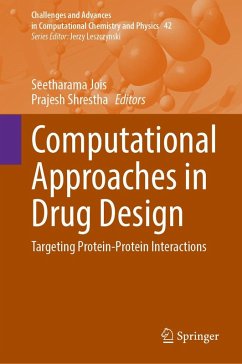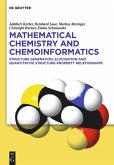Computational Approaches in Drug Design
Targeting Protein-Protein Interactions
Herausgegeben:Jois, Seetharama; Shrestha, Prajesh
Computational Approaches in Drug Design
Targeting Protein-Protein Interactions
Herausgegeben:Jois, Seetharama; Shrestha, Prajesh
- Gebundenes Buch
- Merkliste
- Auf die Merkliste
- Bewerten Bewerten
- Teilen
- Produkt teilen
- Produkterinnerung
- Produkterinnerung
This contributed volume focuses on computational methods and strategies employed in drug design, specifically targeting protein-protein interactions (PPIs). It provides a comprehensive overview of the basic principles of PPIs, computational techniques for predicting binding sites and complexes, and recent advancements in the field. The book features chapters authored by experts, with a strong emphasis on practical applications in drug discovery. Additionally, it highlights the challenges associated with designing PPI inhibitors and the emerging tools and methodologies, including artificial…mehr
Andere Kunden interessierten sich auch für
![Mathematical Chemistry and Chemoinformatics Mathematical Chemistry and Chemoinformatics]() Adalbert KerberMathematical Chemistry and Chemoinformatics128,99 €
Adalbert KerberMathematical Chemistry and Chemoinformatics128,99 €![Activity Cliffs Activity Cliffs]() Kunal RoyActivity Cliffs38,99 €
Kunal RoyActivity Cliffs38,99 €![In Silico Chemistry and Biology In Silico Chemistry and Biology]() In Silico Chemistry and Biology139,95 €
In Silico Chemistry and Biology139,95 €![Concepts, Methods and Applications of Quantum Systems in Chemistry and Physics Concepts, Methods and Applications of Quantum Systems in Chemistry and Physics]() Concepts, Methods and Applications of Quantum Systems in Chemistry and Physics113,99 €
Concepts, Methods and Applications of Quantum Systems in Chemistry and Physics113,99 €![Radiation Induced Molecular Phenomena in Nucleic Acids Radiation Induced Molecular Phenomena in Nucleic Acids]() Radiation Induced Molecular Phenomena in Nucleic Acids228,99 €
Radiation Induced Molecular Phenomena in Nucleic Acids228,99 €![Concepts, Methods and Applications of Quantum Systems in Chemistry and Physics Concepts, Methods and Applications of Quantum Systems in Chemistry and Physics]() Concepts, Methods and Applications of Quantum Systems in Chemistry and Physics115,99 €
Concepts, Methods and Applications of Quantum Systems in Chemistry and Physics115,99 €![Advances in Methods and Applications of Quantum Systems in Chemistry, Physics, and Biology Advances in Methods and Applications of Quantum Systems in Chemistry, Physics, and Biology]() Advances in Methods and Applications of Quantum Systems in Chemistry, Physics, and Biology113,99 €
Advances in Methods and Applications of Quantum Systems in Chemistry, Physics, and Biology113,99 €-
-
-
This contributed volume focuses on computational methods and strategies employed in drug design, specifically targeting protein-protein interactions (PPIs). It provides a comprehensive overview of the basic principles of PPIs, computational techniques for predicting binding sites and complexes, and recent advancements in the field. The book features chapters authored by experts, with a strong emphasis on practical applications in drug discovery. Additionally, it highlights the challenges associated with designing PPI inhibitors and the emerging tools and methodologies, including artificial intelligence and machine learning, to address them. Overall, the book serves as a valuable resource for scientists and researchers interested in leveraging computational and structural biology approaches for designing drugs targeting PPIs.
Produktdetails
- Produktdetails
- Challenges and Advances in Computational Chemistry and Physics 42
- Verlag: Springer / Springer Nature Switzerland / Springer, Berlin
- Artikelnr. des Verlages: 978-3-032-07879-7
- Seitenzahl: 244
- Erscheinungstermin: 3. März 2026
- Englisch
- Abmessung: 235mm x 155mm
- ISBN-13: 9783032078797
- ISBN-10: 3032078792
- Artikelnr.: 75327867
- Herstellerkennzeichnung
- Springer-Verlag GmbH
- Tiergartenstr. 17
- 69121 Heidelberg
- ProductSafety@springernature.com
- Challenges and Advances in Computational Chemistry and Physics 42
- Verlag: Springer / Springer Nature Switzerland / Springer, Berlin
- Artikelnr. des Verlages: 978-3-032-07879-7
- Seitenzahl: 244
- Erscheinungstermin: 3. März 2026
- Englisch
- Abmessung: 235mm x 155mm
- ISBN-13: 9783032078797
- ISBN-10: 3032078792
- Artikelnr.: 75327867
- Herstellerkennzeichnung
- Springer-Verlag GmbH
- Tiergartenstr. 17
- 69121 Heidelberg
- ProductSafety@springernature.com
Dr. Seetharama D. Jois, Ph.D., is a Professor of Cancer Immunology and Computation & Structural Biology, Department of Pathobiological Sciences, School of Veterinary Medicine at Louisiana State University. Before this, he worked as a professor of Medicinal Chemistry in the School of Basic Pharmaceutical and Toxicological Sciences, College of Pharmacy, University of Louisiana at Monroe for 17 years. Before joining the University of Louisiana at Monroe in 2006, he worked as an Assistant Professor in the School of Pharmacy at the National University of Singapore for six years. Dr. Jois obtained his Ph.D. in 1994 from the Molecular Biophysics Unit, Indian Institute of Science (IISc), Bangalore, India, and a master’s degree in physics from the University of Mysore, India. After his Ph.D., Dr. Jois obtained extensive training in Pharmaceutical Chemistry research at the University of Kansas in Lawrence, KS. His research philosophy is to investigate life processes at a molecular level and use fundamental and applied research to improve human health. His research focuses on drug design and discovery, particularly cancer and inflammatory diseases. He is interested in how proteins interact with one another to control life processes. Proteins interact with each other in a highly specific manner, and these specific interactions play key roles in many cellular processes. In normal life processes, these protein interactions are well coordinated to perform the functions of the cells. Any deregulation of this process can lead to the development of many diseases. His research group is interested in developing peptides/peptidomimetics to modulate protein-protein interactions (PPI), and such molecules are useful as therapeutic agents. He uses computational as well as experimental methods to investigate the PPI and its inhibition. His three major research projects are related to cell surface proteins and targeting these proteins using peptides, peptidomimetics, and grafted peptides. Dr. Jois’ current research is on EGFR-related non-small cell lung cancer (NSCLC) and HER2-positive breast cancer. His collaborative research includes developing an imaging agent for EGFR-related colorectal cancer. Dr. Jois is supported by funding from the National Cancer Institute of the National Institutes of Health. He has published over 120 peer-reviewed papers. Mr. Prajesh Shrestha is a graduate student in the Department of Pathobiological Sciences at the School of Veterinary Medicine, Louisiana State University (LSU), Baton Rouge. He obtained his undergraduate degree in Pharmacy from Tribhuvan University in Nepal. He began his professional career as a Senior Formulation and Development Officer at Accord Pharmaceuticals Pvt. Ltd. in Nepal, where he gained valuable experience in drug formulation and pharmaceutical development. He joined LSU to pursue his Ph.D. under the mentorship of Dr. Seetharama D. Jois. His research focuses on rational design and evaluation of peptides and peptidomimetics targeting critical protein-protein interactions (PPIs), with a particular emphasis on non-small cell lung cancer. His current work involves comprehensive in vitro and in vivo studies aimed at inhibiting HER2 dimerization, with the long-term goal of developing next-generation therapeutic peptides that exhibit enhanced stability, selectivity, and oral bioavailability. In addition to his experimental work, he is also well-versed in various computational drug discovery tools that he integrates into his research. In addition to his primary research, he is also actively involved in collaborative projects focused on evaluating targeted diagnostic agents for EGFR-driven colorectal cancers. He has authored several peer-reviewed publications and has presented his work at numerous scientific conferences. He is also an active member of the American Association of Pharmaceutical Scientists (AAPS).
Going Deep: The Power of Deep Learning to Uncover Disease-Driven Protein-Protein Interactions and Accelerate Drug Design.- Protein-Protein Interaction Network Analysis and Visualization Tools: A Comprehensive Review.- Cryo-Electron Microscopy in the Study of Protein-Protein Interactions.- Application of the TSR-Based Method in Detecting and Quantifying Ligand-Induced Conformational Changes of 14-3-3 Proteins.- A Comprehensive Case Study of Host-Pathogen Protein-Protein Interactions: Exploring the Human Proteins Targeted by HIV and MTB.- Computational Methods and Tools for the Design and Development of Small Molecule Inhibitors Targeting PPIs.- Peptides and Peptidomimetics as Inhibitors of Protein-Protein Interactions.- Protein Trimerization and Viral Fusion: Structural Insights and Therapeutic Applications.- A Compilation of Software Tools for Studying Protein-Protein Interactions.
Going Deep: The Power of Deep Learning to Uncover Disease-Driven Protein-Protein Interactions and Accelerate Drug Design.- Protein-Protein Interaction Network Analysis and Visualization Tools: A Comprehensive Review.- Cryo-Electron Microscopy in the Study of Protein-Protein Interactions.- Application of the TSR-Based Method in Detecting and Quantifying Ligand-Induced Conformational Changes of 14-3-3 Proteins.- A Comprehensive Case Study of Host-Pathogen Protein-Protein Interactions: Exploring the Human Proteins Targeted by HIV and MTB.- Computational Methods and Tools for the Design and Development of Small Molecule Inhibitors Targeting PPIs.- Peptides and Peptidomimetics as Inhibitors of Protein-Protein Interactions.- Protein Trimerization and Viral Fusion: Structural Insights and Therapeutic Applications.- A Compilation of Software Tools for Studying Protein-Protein Interactions.








